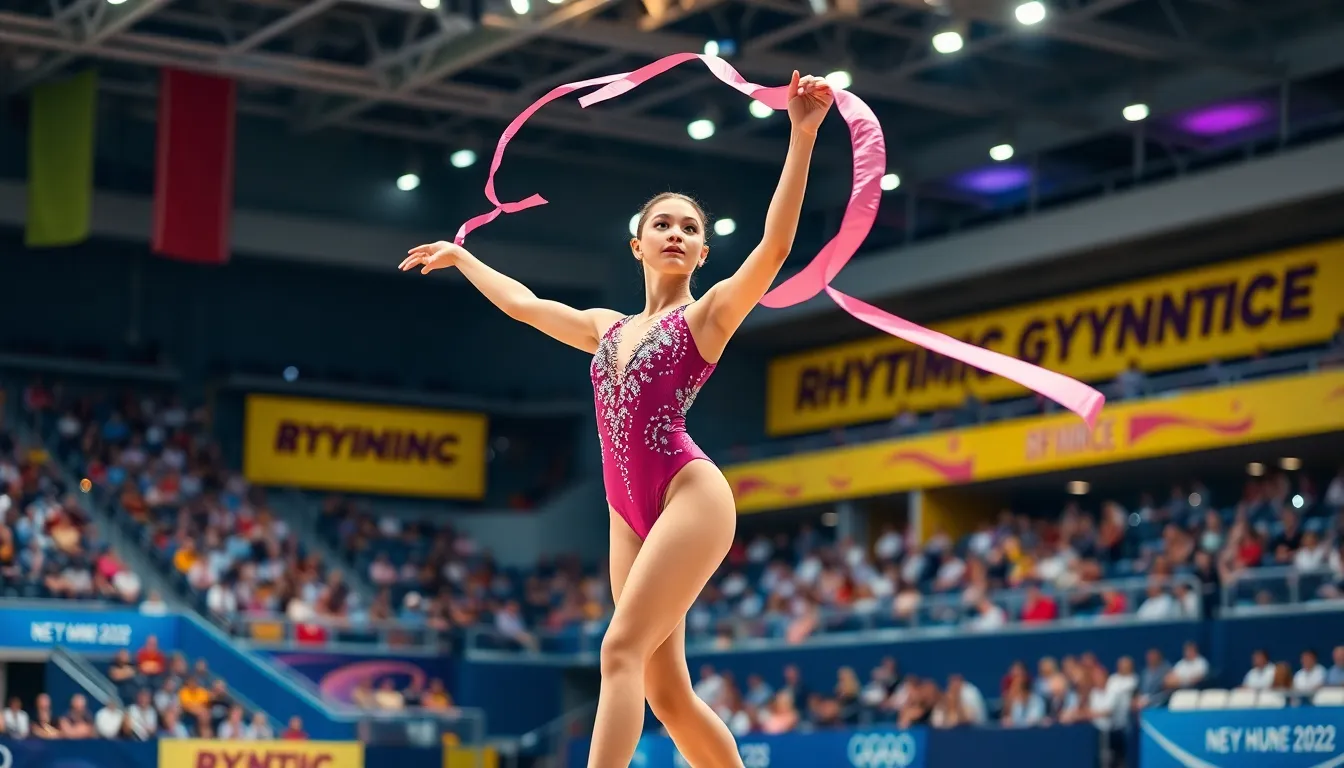Rhythmic gymnastics: the sport where grace meets athleticism, and where tossing a ribbon can be as exciting as a tightrope walk over a pit of crocodiles. So, what’s all the buzz around this dazzling discipline? Whether you’re a fan of the sport, a budding gymnast, or just someone who can barely touch their toes, buckle up. We’re diving into the latest trends, standout stars, and what the future holds for rhythmic gymnastics.
Table of Contents
ToggleOverview of Rhythmic Gymnastics

History and Evolution
Rhythmic gymnastics isn’t just a recent invention: its roots stretch back to the late 19th century. Originally, it was a blend of artistic dance and gymnastics, gaining significant traction in the early 20th century. By the time it was introduced to the Olympics in 1984, the sport evolved into the breathtaking spectacle we enjoy today. Each performance embodies a connection between the gymnast and the musical rhythm, transforming athletic movements into artful expressions.
Key Elements of the Sport
What makes rhythmic gymnastics stand out? The sport incorporates various apparatus, including ribbons, balls, hoops, clubs, and ropes, each requiring distinct skills. Athletes perform choreographed routines set to music, showcasing not just strength and agility but also their artistry. A perfect balance of flexibility, coordination, and emotional expression is vital, making it a sport that captivates audiences worldwide.
Current Trends in Rhythmic Gymnastics
Popular Competitions and Championships
Today, events like the World Championships and European Championships are major highlights on any gymnast’s calendar. The Tokyo 2020 Olympics brought rhythmic gymnastics into the spotlight, showcasing spectacular performances from around the globe. Internationally, spotlight competitions continue to burgeoning in popularity, with each attracting thousands of fans eager to see the latest routines.
Notable Athletes to Watch
Among the glittering stars in rhythmic gymnastics, names like Dina Averina and Linoy Ashram shine bright. Dina Averina, known for her mesmerizing grace, has redefined routine performances with flawless execution. Likewise, Linoy Ashram’s unique style has garnered her an enthusiastic following, merging traditional elements with modern flair. These athletes have demonstrated that rhythmic gymnastics is not just about tradition but also innovation.
Techniques and Training Insights
Commonly Used Apparatus
The core of rhythmic gymnastics lies in its apparatus. Whether it’s the fluid spiral of the ribbon or the bouncing rhythm of the ball, each piece requires mastery. Clubs and hoops add a layer of complexity, challenge the gymnast to not only juggle but also layer movements seamlessly into their routines. Understanding each apparatus, and knowing how to use it effectively, takes practice, creativity, and, let’s face it, quite a few tears along the way.
Training Regimens and Approaches
In the gym, dedication is key. Typically, athletes engage in multiple training sessions each week, combining strength training with flexibility exercises and choreography practice. Not to mention the hours spent perfecting routines and learning to synchronize moves with music. Coaches emphasize developing a keen sense of rhythm and expression, pushing athletes to be not just competitors but performers.
The Future of Rhythmic Gymnastics
Emerging Talents and Innovations
As the sport enters a new era, emerging talents are stepping forward, bringing fresh ideas and techniques. Young gymnasts are inspired by their predecessors, yet they also seek to carve out their distinct styles. Innovations in choreography and performance are increasingly common, highlighting the sport’s adaptive nature as it evolves.
Influence of Technology on Performance
Technology is also making waves in rhythmic gymnastics. From interactive training methods using VR to advanced analytics that help enhance routines, the future is bright. Coaches can now use data to refine techniques, ensuring athletes perform at their very best. It’s a fascinating intersection of sport and science that will undoubtedly elevate performances.


